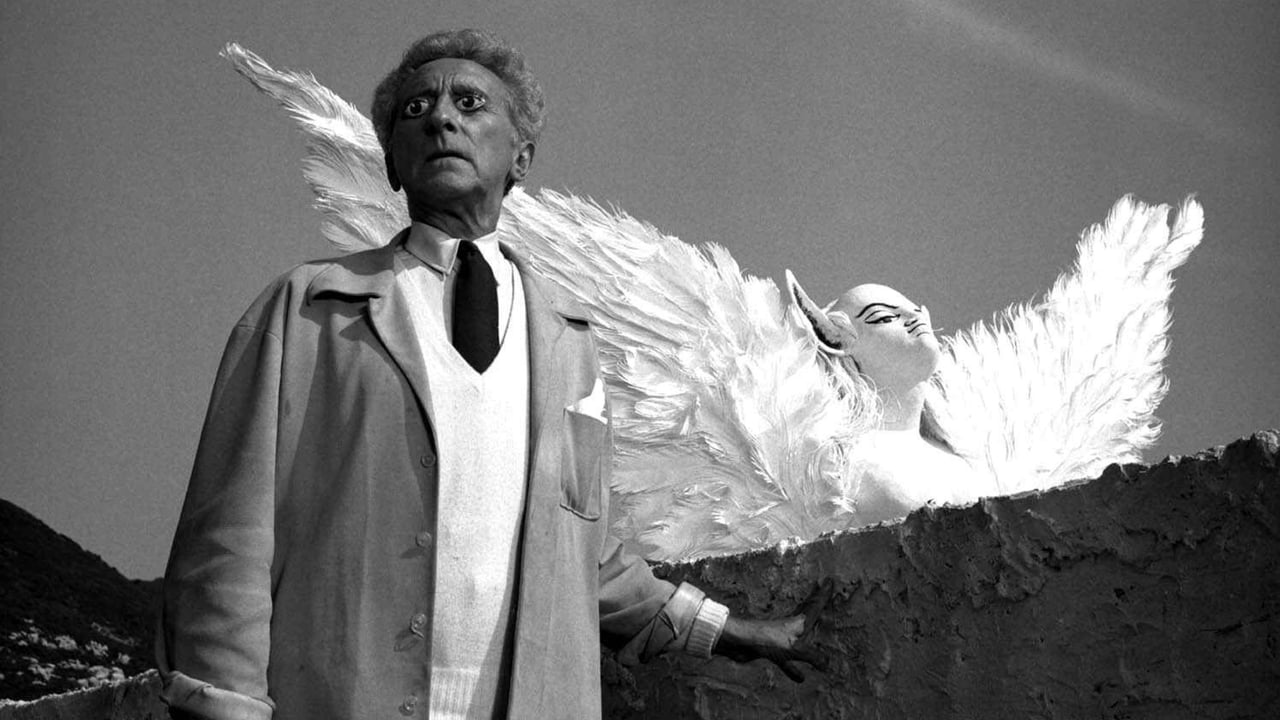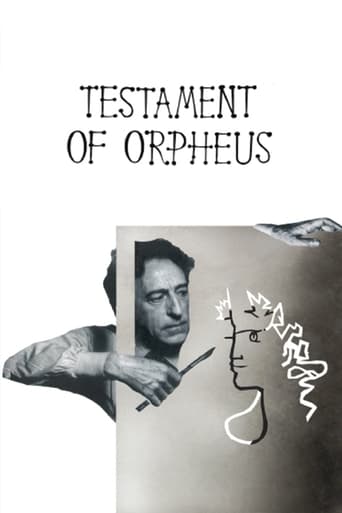



I like Black Panther, but I didn't like this movie.
View MoreGo in cold, and you're likely to emerge with your blood boiling. This has to be seen to be believed.
View MoreThe film creates a perfect balance between action and depth of basic needs, in the midst of an infertile atmosphere.
View MoreThis movie tries so hard to be funny, yet it falls flat every time. Just another example of recycled ideas repackaged with women in an attempt to appeal to a certain audience.
View MoreLe Testament d'Orphée is an uneven work compared to the more achieved and better realized Orphée (to which it is very tightly related of course) and for this reason, may not appeal to everyone, even those who were enchanted by Cocteau's visual poetry in Orphée. There are of course a good number of puzzling scenes, but they remain quite tame compared to Le Sang d'un Poète, a much more hermetic and typically surrealistic film (a la Bunuel), and Cocteau's approach, far from being that of some elitist intellectual, is in fact caring for his audience. The imagery presented to us in Le Testament is often introduced by Cocteau's off voice and very often also, by himself on screen. I always felt welcome to his world, comfortable in his poetic universe, because he truly seems preoccupied by how we react to what is shown to us. The numerous scenes with the Hibiscus flower are at the heart of how the various components of Cocteau's clockwork interact for the benefit of his spectators. We marvel at simple things now: Cocteau debunks the symbolism of the second part of the Trilogy: we're reminded that Cégeste and Heurtebise are the fruits of an early poem by Cocteau. We are reunited with the Princess (Maria Casares) and Heurtebise (François Périer) at a tribunal where everything and everyone now seems to be less threatening, where everyone is taking oneself less seriously than in Orphée. Le Testament is truly a work of love, of true affection from Cocteau to everyone of us.There is nothing pretentious here, and only a few philistines may remain impervious to Cocteau in the same way as they likely are to poetry in general. Poets are the least well understood workers in our society, and for the densest among us, they are probably completely useless parasites living out of public charity. But if Cocteau's message is to be of any significance today to his fellow humans, 50 years after his death, it is that poetry does not need to be some hermetic language published in expensive editions for a happy few enlightened elite cut from the rest of society. One of Cocteau's pioneering contributions is his use of the "cinématographe" – as he liked to refer to it – as a tool for a poet to convey the mechanics of his mind to something tangible. He often said (e.g. watch the fascinating documentary Jean Cocteau: Autoportrait d'un inconnu (1985) on the Criterion edition of Le Sang d'un Poète, a must-see to truly understand Cocteau's cinema) that the poet does not control what he thinks, what he imagines, etc.: he is merely a conduit between some immaterial but powerful source (call it God, the gods or whatever) and his fellow mortals. Cocteau was the first recognized published poet to use cinema successfully and creatively to express poetry from the privileged and original point of view of a poet. His most achieved work in this respect was La Belle et la Bête, but the Orphée "trilogy" is a close contender for that matter. Furthermore, unlike other surrealists and fellow artists of his era (such a brilliant one, with so many luminaries from times the likes of which we will never see again – ours is a whole different universe) whose output was mainly through painting and literature exclusively, Cocteau's poetic films are not only still among us, but through the contribution of scholars or simply cinema lovers, still resonate to this day and enjoy a second or third life thanks to the democratizing effect of digital technology. And this is where his effect and influence on us is at its most vivid and significant.One can rightly argue that Cocteau's cinematographic book of tricks gets rapidly limited as we watch his films, and that his gimmickry may appear a little bit naive, especially to 21st-century eyes. However, one must be reminded that what we witness by viewing his films is the vision of a poet, and this is where the viewer must try to put him (her)self, i.e. to discard our unforgiving, CGI-saturated view of film images, and concentrate on the symbolism of Cocteau's universe.This is why one should not watch the Testament d'Orphée before the better rounded up works, especially La Belle et la Bête, which is a true masterpiece. And as with all masterpieces, everything else, including one artist's other works, pales in comparison. But at least, Cocteau's language becomes better articulated and more understandable once we have been exposed to the most seamless of his poems.
View MoreMy summary is NOT meant to be sarcasm but an accurate description of what I saw in "Testament of Orpheus". It really does play a lot like a home movie of Cocteau's--complete with his friends making guest appearances. A few of the more notable ones are Jean Pierre Leaud, Pablo Picasso and Yul Brynner. As for the plot, it's really hard to describe and it is VERY freaky. It's sort of like a combination of a dream, the life of Cocteau, time travel and Greek mythology all rolled into one very strange film. If you try to make sense of all this, it will probably make your head explode--and it seems pretty clear that Cocteau had no intention of making the film understandable or doing a traditional narrative. Because it is essential a vanity project and an art film, I really cannot rate it. However, I think I'm very safe in saying that the film probably holds no interest to the average viewer but is something best seen by Cocteau-philes and lovers of the avant garde or surreal.As for me and my own opinion about the film's merits, I thought the project was very repetitive--though it did have a few moments of interesting introspection by Cocteau (who plays himself through the film). Sadly, though, despite his introspection, this is yet another Cocteau film in which he over-used slow-motion and rolled the film backwards again and again to achieve his artsy effects. Essentially, you see nothing new here in the way of techniques--having seen this is "Blood of a Poet" thirty years earlier. And, it does not have any sort of lasting appeal or a coherent story like "Orpheus" or "Beauty and the Beast" (his two masterpieces). Skipable if you ask me but a mildly (very mildly) interesting piece of performance art.
View MoreI've never been impressed by Cocteau's films but I give him credit for having the energy to put his personal takes on myth and symbolism on film. Unfortunately, one really needs to be steeped in the various characters of Greek Myth to appreciate this one. The imagery is quite imaginative and the situations are sometimes funny but the whole never comes together. It's just one pointless existential tableau after another, which may be Cocteau's aim but it fails as substantial entertainment. The various contemporary celebrities that have cameos do little and add little to the film. I can really only recommend this film to those who want to learn about Cocteau's film style or those who like to see the Classic Greek myths used in a mid-20th century film medium. Otherwise, it's a jumble of confusing dialogue and imagery to be taken not so seriously.
View MoreThere are nice ideas in this final film by Cocteau. It's a pity he made it in 1959: there had already been Bunuel's l'Age d'or (1930) and Un chien andalou (1929), Bergman's Wild Strawberries (1957) and The Seventh Seal (1957) that are all brilliant. Not to mention Cocteau's own Sang d'un poete (1930!), in which the relatively simple technical ideas of Testament d'Orphee were already worked out and even better too. Cocteau utilizes terribly slow motion and awkward backwards play. Where Orpheus was ambitious, this is mere pretentious. The acting is mediocre, despite the interesting cast (Cocteau, Brynner, Picasso). Testament is less thought provoking and less surprising than what I hoped for, but nevertheless worth a try. Perhaps I wasn't in the mood for conversations about eloquence and poetry at the time. Still it is at least as interesting as Orson Welles' F for Fake (1975) in which Cocteau also appeared so prominently.7/10
View More